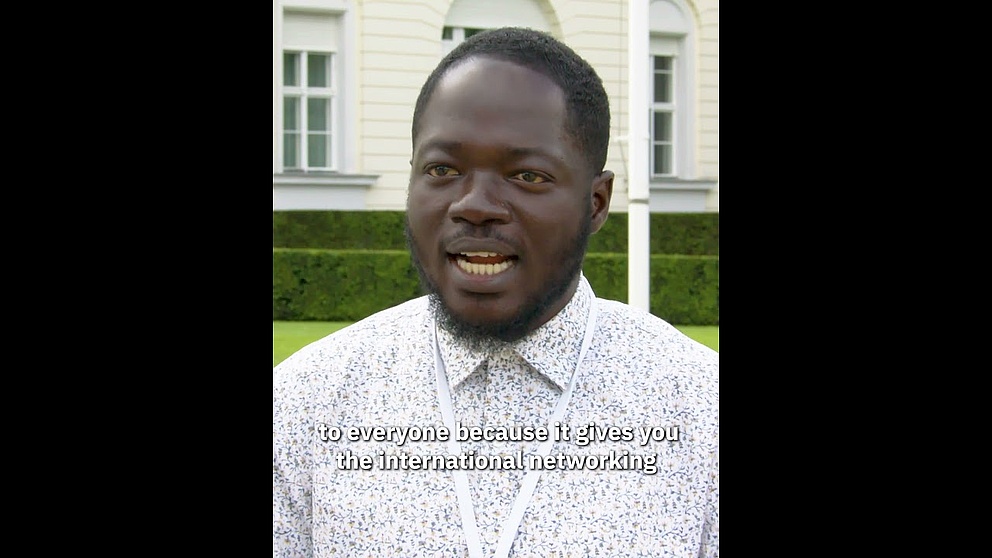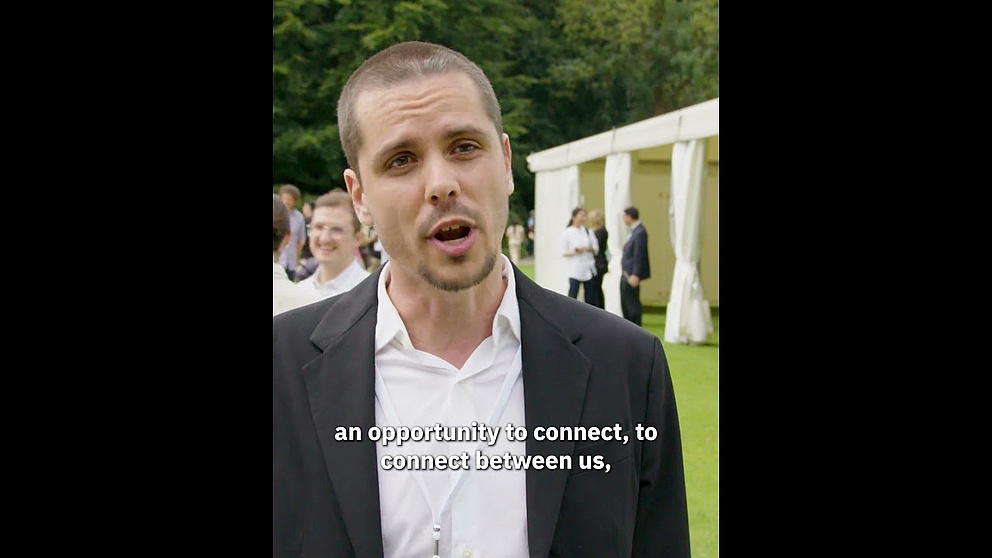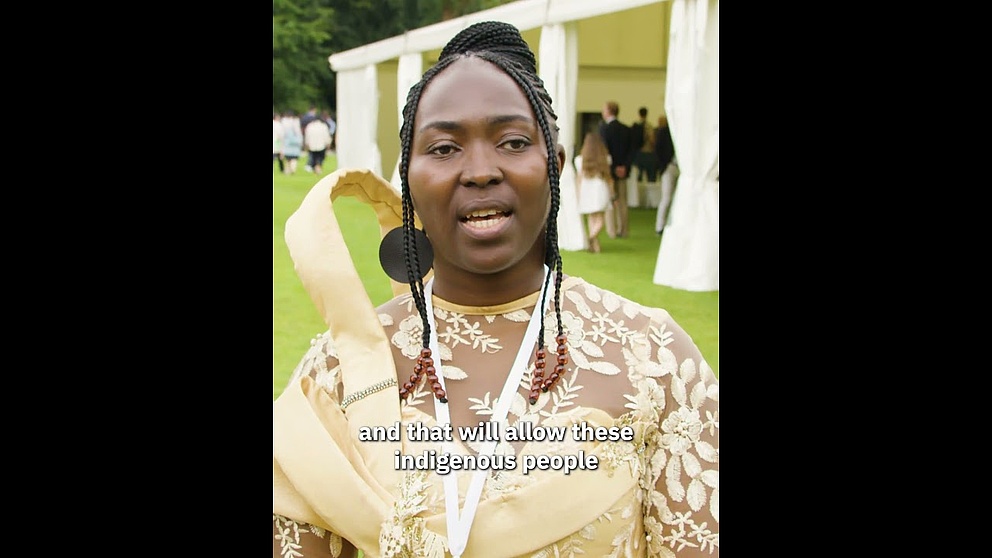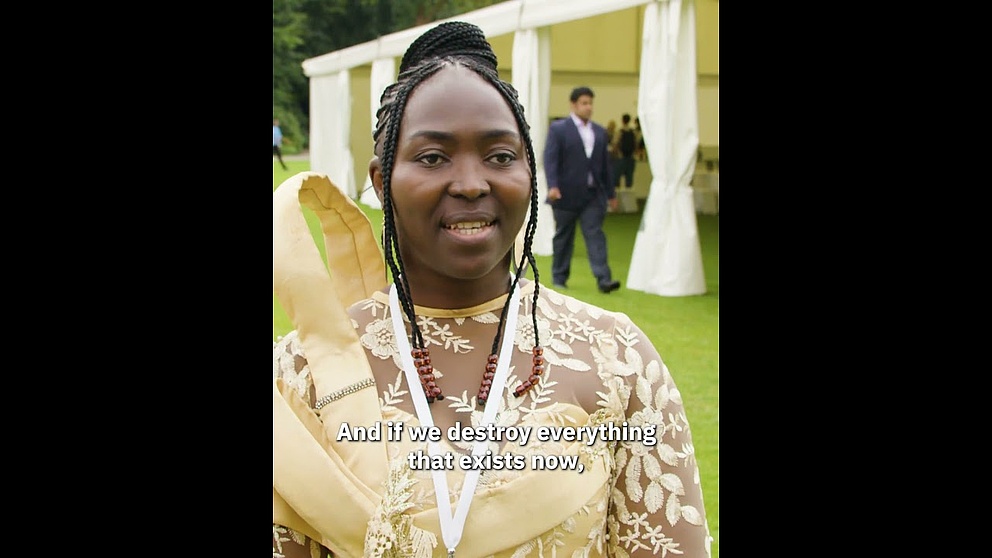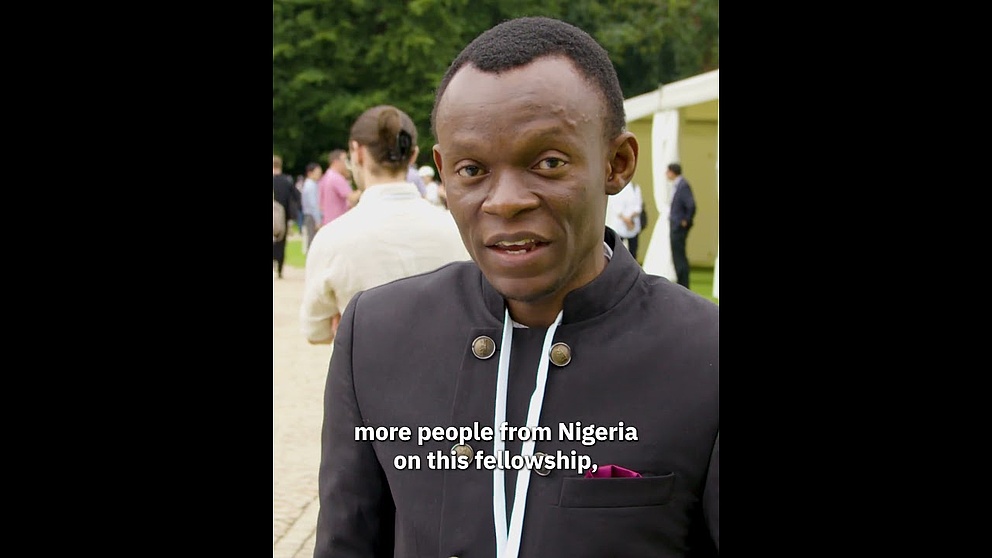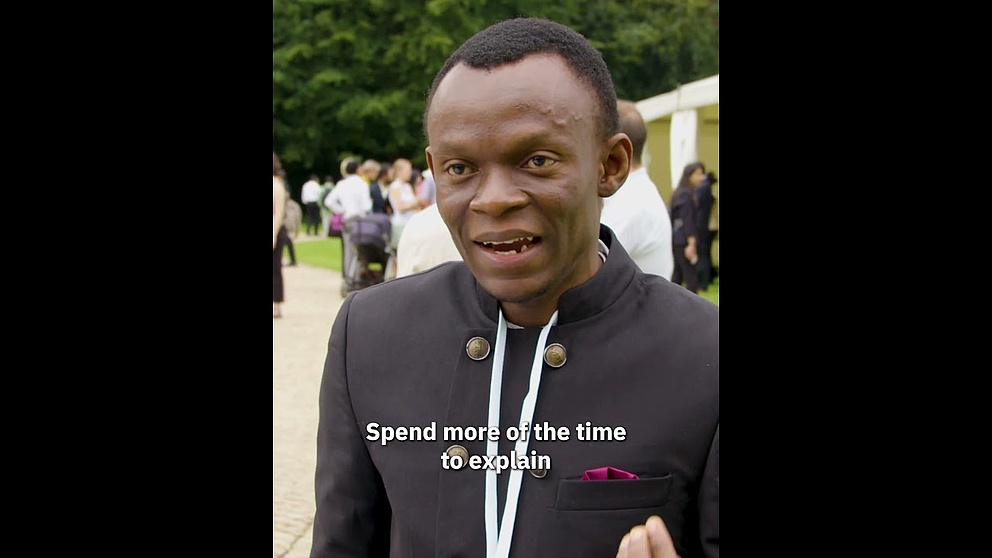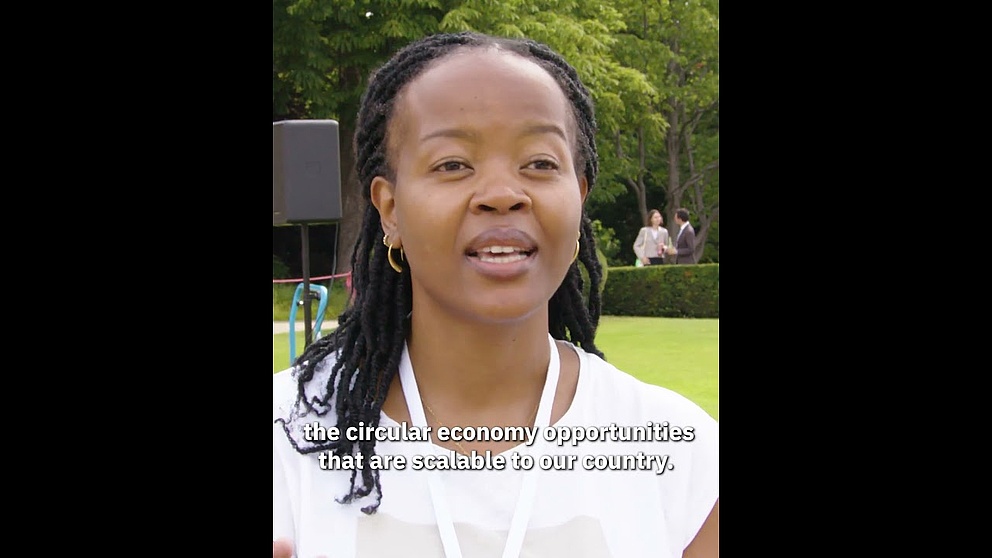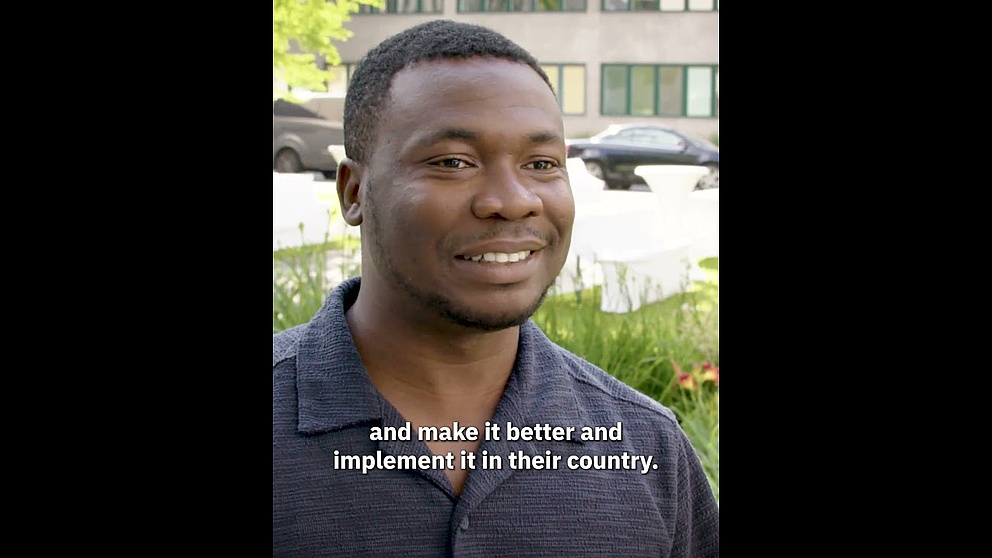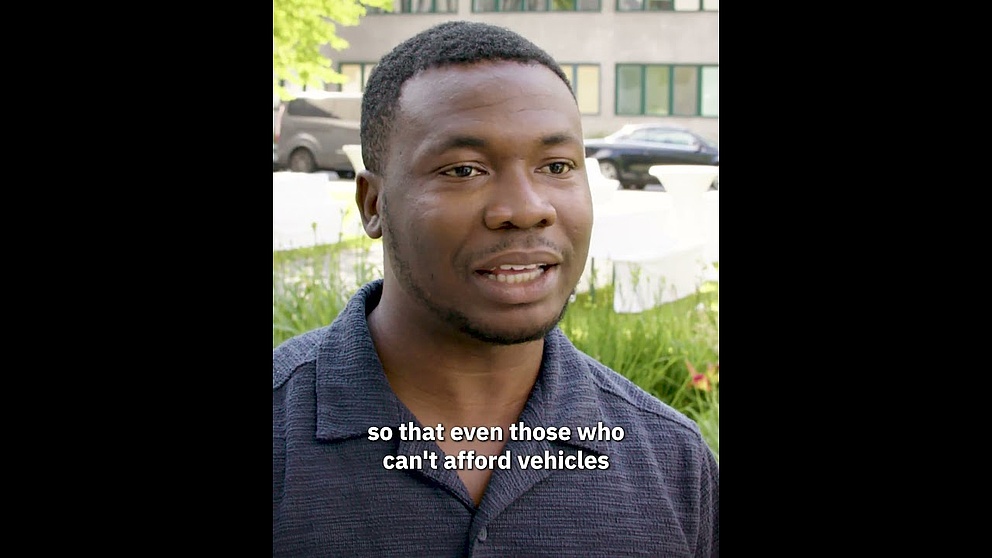Jump to the content
- {{#headlines}}
- {{title}} {{/headlines}}
Below, you can get to know a selection of seven IKS fellows who have impressed us with their research ideas and personal perspectives. Each portrait offers a concise profile, an insight into the respective field of research and a short video statement.
The seven fellows are:
At the bottom of the page, you will also find detailed profiles of all IKS Fellows from previous years as PDF documents.

Darius Saviour Ankamah
Degree: Bachelor of Science | Field: Human geography | Home Institution: Alliance for Youth in Climate Change Action – AYCCA, Wa, Ghana | Host Institution in Germany: German Institute of Development and Sustainability (IDOS), Bonn | Host: Dr Susan Ekoh
Climate-induced human mobility and psychological resilience in Ghana
As climate-related events intensify, understanding their socio-psychological impacts becomes crucial. Climate-induced mobility often leads to distress, identity shifts, and vulnerability, yet these effects are understudied. Darius Saviour Ankamah aims to address this gap through oral history and action research with 150 families in Keta, Ghana. His study explores coping strategies, community support, and resilience to foster sustainable adaptation, and will be supported by the German Institute of Development and Sustainability in Bonn.

Thaiane Fatima Maciel dos Santos
Degree: Bachelor of Science | Field: Urban Planning and Development, Landscape, Traffic, and Infrastructure Planning | Home Institution: Canal Novo Mundo, Rio de Janeiro, Brazil | Host Institution in Germany: natureplus e.V., Neckargemünd | Host: Tilmann Kramolisch
Giving plastic pollution a purpose
Plastic debris constitutes 80 % of all marine litter, causing environmental and health risks. In Brazil, innovative recycling can create jobs and address climate-related water issues. Thaiane Fatima Maciel dos Santos’ project engages local communities in collecting, sorting, and recycling plastic into new products, promoting a circular economy and sustainability. The project will be supported by Natureplus e.V. in Neckargemünd.

Carlos Manuel Calzadilla Guerra
Degree: Master of Science | Field: Urban Planning and Development, Landscape, Traffic, and Infrastructure Planning | Home Institution: Escuela de Arquitectura, Universidad Catolica Andres Bello, Caracas, Venezuela | Host Institution in Germany: Ecologic Institute, Berlin | Host: Ewa Iwaszuk
Urban vacant land as driver for climate adaptation and biodiversity
Latin American cities face increasing social inequality due to climate change, with much vacant urban land remaining unused. Repurposing this land can enhance green infrastructure, support biodiversity, mitigate climate impacts, and improve community resilience. Carlos Manuel aims to develop guidelines and policy instruments to use urban vacant land for climate adaptation and mitigation, including nature-based solutions like parks, urban canopies, and retention ponds. The project will be supported by the Ecologic Institute in Berlin.

Dr Yollande Tankeu Meli
Degree: PhD | Field: Economic Policy, Applied Economics | Home Institution: Nkafu Policy Institute, Yaounde, Cameroon | Host Institution in Germany: Leibniz Centre for Tropical Marine Research, Bremen | Host: Prof. Dr Achim Schlüter
Conservation and restoration of coastal mangroves for climate change adaptation in Cameroon
Mangrove ecosystems face global threats from deforestation, land use change, pollution, and climate change, leading to habitat loss and reduced ecosystem services. In Cameroon, mangroves are declining by about 1 % per year. Dr. Yollande Tankeu Meli aims to assess vulnerable areas, evaluate community awareness, and develop a conservation and restoration plan that supports climate adaptation and local communities. Her research will be supported by the Leibniz Centre for Tropical Marine Research in Bremen.

David Omata
Degree: Master of Science | Field: Statistics and Econometrics | Home Institution: The Nigerian Economic Summit Group, Abuja, Nigeria | Host Institution in Germany: Africa Policy Research Institute, Berlin | Host: Dr Grace Mbungu
Balancing the tradeoffs between energy transition and economic development in Africa
Renewable energy innovations support the energy transition, but economic growth can hinder the shift to sustainable energy, especially in Africa due to its diverse socioeconomic contexts and climate vulnerability. David Omata’s study aims to analyze the interplay between clean energy, economic growth, and climate action, providing policy recommendations and a tailored framework for African countries. His research will be supported by the Africa Policy Research Institute in Berlin.

Brenda Komugisha
Degree: Master of Science | Field: Architecture, Building and Construction History, Building Research, Resource, Economics in Civil Engineering | Home Institution: Office of the Prime Minister, Kampala, Uganda | Host Institution in Germany: Institute of Waste Management and Circular Economy, Technische Universität Dresden, Pirna | Host: Prof. Dr Christina Dornack
Towards a better reality: Addressing climate change through sustainable waste management in Uganda’s cities
Uganda’s rapid urbanization and poor waste management have caused pollution, flooding, and health problems in cities like Kampala, with much waste uncollected and contributing to greenhouse gas emissions. Brenda Komugisha aims to improve urban waste management by applying Germany’s best practices in Uganda. Through interviews, surveys, and document analysis, she seeks sustainable solutions to mitigate climate impacts and promote environmental protection. The project will be supported by the Institute of Waste Management and Circular Economy in Pirna, part of Technische Universität Dresden.

Manuel Nii Martey Mensah
Degree: Master of Philosophy | Field: Urban Planning and Development, Landscape, Traffic, and Infrastructure Planning | Home Institution: National Road Safety Authority, Cape Coast, Ghana | Host Institution in Germany: University of Kassel | Host: Prof. Dr Angela Francke
Enhancing mobility as climate mitigation strategy
Walking, cycling, and micromobility promote social, environmental, and economic sustainability. While Africa’s road infrastructure prioritizes cars, Ghana’s Emission Levy Act 2023 encourages eco-friendly transport. Manuel Nii Martey Mensah compares the university cities of Cape Coast (Ghana) and Kassel (Germany) to assess sustainable mobility measures, examine campus readiness for eco-friendly commuting, and explore ways to scale these solutions to urban mobility. He will use an embedded mixed methodology approach and be supported by the University of Kassel in Kassel.
Responsible for the contents: Dr Judith Schildt and Dr Tina-Maria Schieder (Humboldt Foundation) and the fellows
All fellows and their projects
- Climate Protection Fellows 2026/2027 (PDF, 3 MB)
- Climate Protection Fellows 2025/2026 (PDF, 3 MB)
- Climate Protection Fellows 2024/2025 (PDF, 3 MB)
- Climate Protection Fellows 2023/2024 (PDF, 901 KB)
- Climate Protection Fellows 2022/2023 (PDF, 828 KB)
- Climate Protection Fellows 2021/2022 (PDF, 1 MB)
- Climate Protection Fellows 2020/2021 (PDF, 1 MB)
- Climate Protection Fellows 2019/2020 (PDF, 2 MB)
- Climate Protection Fellows 2018/2019 (PDF, 6 MB)
- Climate Protection Fellows 2017/2018 (PDF, 3 MB)
- Climate Protection Fellows 2016/2017 (PDF, 5 MB)
- Climate Protection Fellows 2015/2016 (PDF, 5 MB)
- Climate Protection Fellows 2013/2014 (PDF, 908 KB)
- Climate Protection Fellows 2012/2013
- Climate Protection Fellows 2011/2012 (PDF, 2 MB)
- Climate Protection Fellows 2010/2011 (PDF, 3 MB)

